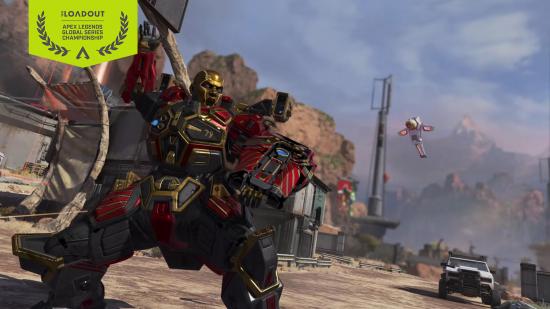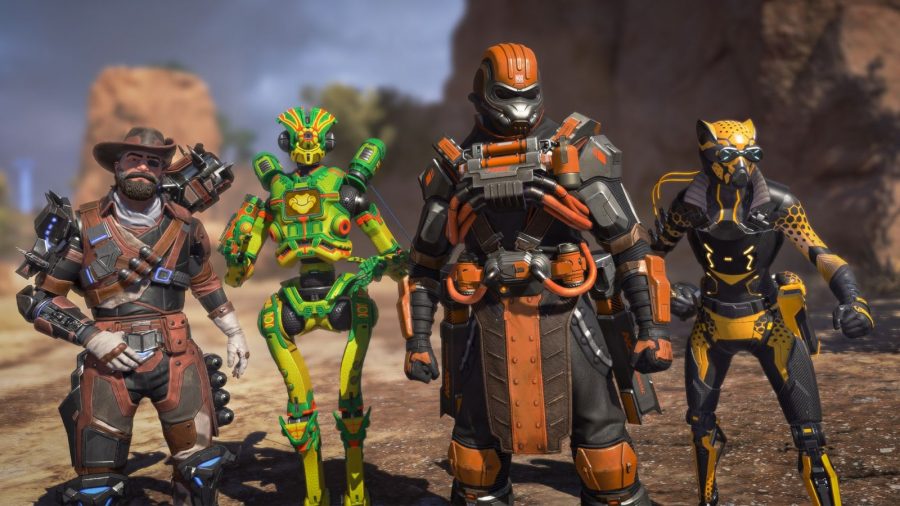“It means a lot for the African orgs and the players to compete at this high level, and for this much money,” says Matthew ‘DaStwika’ Ries. DaStwika plays Apex Legends for South African organisation ATK, and often has to remind people that the EMEA Super Region encompasses more than just Europe. “There are teams that are not based in Europe trying to compete for the ALGS Championship.”
Teams from the Middle East and Africa (which make up the ME and A of EMEA respectively) don’t often make the headlines, but solid performances from Fenerbahçe Esports and a much-improved showing on day two from ATK have turned some heads away from the European teams that so often dominate proceedings.
Despite being the highest-seeded African team in the ALGS Championship, ATK’s road here hasn’t been easy. DaStwika’s internet connection at home in Durban has been poor since moving house in March this year, so his organisation was willing to fly him to Cape Town, which has much better internet infrastructure, for the big tournament. Flying to Turkey was also considered before coronavirus cases in the country rose. And then the UK opened its borders.
“I’ve always wanted to visit the UK,” says DaStwika, who was excited when his organisation gave the green light to put the team on a plane to London.. Playing from the UK promises much lower ping than the players are used to in online tournaments, and he flew out on May 20 with high hopes. It’s not uncommon for ATK to play in tournaments with around 200 ping, meaning that their actions can take four times as long to register in-game than players who are located closer to the server.
This results in a lot of ‘no-regs’ – shots which appear to hit an opponent on your screen but don’t do damage. Even MEA tournaments are hosted on EU servers, giving a distinct advantage to Turkish and Middle Eastern teams.
DaStwika quickly realised that many people don’t know the African teams as well as they do the European orgs like Alliance or Gambit. Even orgless rosters like soloQgoats are more well-known than South African teams like ATK and DMNK. “People don’t know ATK and DMNK are from South Africa,” he says. “People assume that we’re playing on the same ping as everyone else, but we’re at more of a disadvantage than any other team.”
But ATK’s quest to overcome its ping disadvantage has not been easy. The first issue DaStwika faced, before he had even arrived in the country, was that his teammates would not be able to join him abroad. His British passport allowed him easy entry into the UK, but his South African compatriots could not get visas at this time.
DaStwika also knew that he would be confined to quarantine in his hotel room for the first ten days of his visit to England, but he was hopeful that the better connection to EU servers would make up for it. He was only half right.
“I felt like I was in prison,” he laughs. “They were giving me food and stuff, but I couldn’t leave the hotel room. It was weird.”
Finding an org: Nessy’s rocky road to the ALGS Championship
That meant, for scrims, DaStwika was not only held hostage by quarantine restrictions, but also by the hotel’s WiFi connection. Anyone who has tried to watch a 240p Facebook video or make a WhatsApp call in a British hotel before knows that the WiFi is unstable at best, and unusable at worst. But things started surprisingly well for DaStwika.
“For the first day, ping was amazing,” he says, enthused by the thought of playing a tournament at 50 ping rather than his usual 200. “But for the next nine days the internet was garbage. It was constantly lagging or not working at all, so practise was difficult… I couldn’t choose when to play Apex, I had to play whenever the internet was stable enough.”
— ATK DaStwika (@DStwika) May 21, 2021
Most of the region’s scrims occurred during that nine-day period, so practises were, in DaStwika’s own words, “terrible.” Although he was freed from quarantine on the Sunday before the group stages kicked off and therefore able to head to a busy London gaming bar to play with better connection, the first day of the ALGS Championship didn’t go much better than ATK’s scrims.
“On the first day of the tournament, we were going in blind,” he says. “But for [day two] we got back to our feet and pushed through all the tough times.”
It would be easy to get frustrated with the constant technology issues that are preventing ATK from achieving their full potential, but DaStwika takes it all in his stride, and takes any hurdle with a healthy pinch of humour.
Day one was ATK’s first Championship practise, so to speak, and they performed much better on day two when Group A faced Group C. ATK finished the six rounds in seventh place, picking up 19 kills and a second-place finish for their troubles. It was only a dominant Gambit that pipped them to first place in the final round.
But despite the esports bar fixing DaStwika’s hotel-based internet problems, technology still wasn’t playing ball. After all, his ATK teammates are still playing at with extremely poor connection – even reaching 300 ping at points during day two – and he didn’t want to risk taking his gaming PC on an 11-hour flight.
“I had between 80 and 100fps for a whole game,” he explains. The gaming laptop he plays on is admittedly top of the range, but he couldn’t risk restarting it in case he couldn’t get back into the match. In a lobby where opponents are likely playing on anything from 140 to 240fps, his reaction times could be three times slower than the players he’s facing through no fault of his own.

DaStwika plans to restart his laptop between every game of day three, to try to mitigate any framerate drops that could impact ATK’s performance when it matters most. The South Africans’ solid showing on day two has put them in with a fighting chance of qualifying for the Championship Finals, but their sights are set even higher.
“Our goal is to win on Saturday,” says DaStwika. “If we can’t, then getting top 20 is the next goal.”
ATK’s players are separated by 6,000 miles, playing a tournament from different continents and opposite hemispheres, but they are coming together to overcome the technological odds that are stacked against them. They’re coming together because there’s more on the line than individual glory: they also want to make people finally notice Africa’s often forgotten Apex Legends scene.

